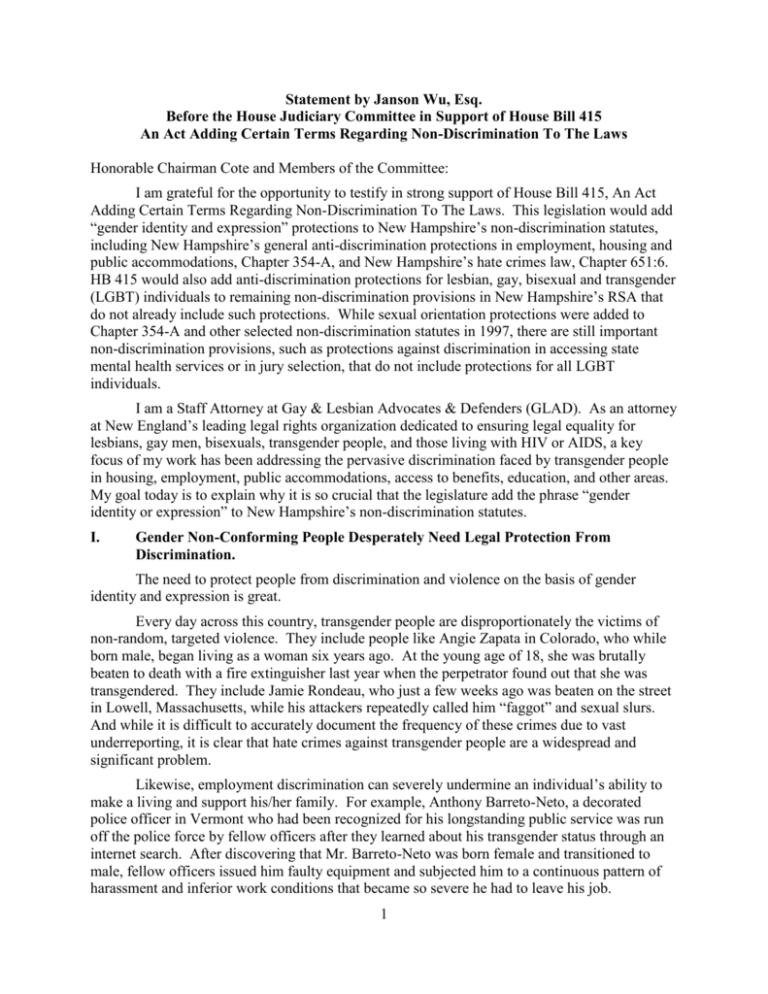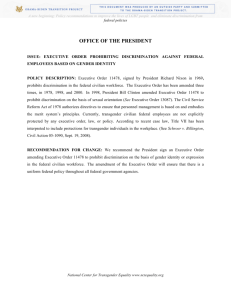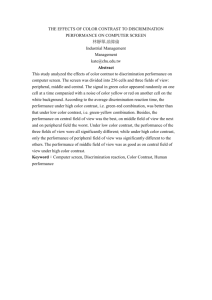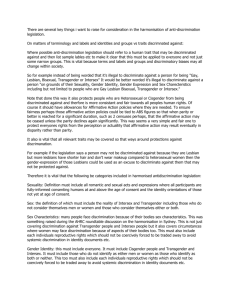
Statement by Janson Wu, Esq.
Before the House Judiciary Committee in Support of House Bill 415
An Act Adding Certain Terms Regarding Non-Discrimination To The Laws
Honorable Chairman Cote and Members of the Committee:
I am grateful for the opportunity to testify in strong support of House Bill 415, An Act
Adding Certain Terms Regarding Non-Discrimination To The Laws. This legislation would add
“gender identity and expression” protections to New Hampshire’s non-discrimination statutes,
including New Hampshire’s general anti-discrimination protections in employment, housing and
public accommodations, Chapter 354-A, and New Hampshire’s hate crimes law, Chapter 651:6.
HB 415 would also add anti-discrimination protections for lesbian, gay, bisexual and transgender
(LGBT) individuals to remaining non-discrimination provisions in New Hampshire’s RSA that
do not already include such protections. While sexual orientation protections were added to
Chapter 354-A and other selected non-discrimination statutes in 1997, there are still important
non-discrimination provisions, such as protections against discrimination in accessing state
mental health services or in jury selection, that do not include protections for all LGBT
individuals.
I am a Staff Attorney at Gay & Lesbian Advocates & Defenders (GLAD). As an attorney
at New England’s leading legal rights organization dedicated to ensuring legal equality for
lesbians, gay men, bisexuals, transgender people, and those living with HIV or AIDS, a key
focus of my work has been addressing the pervasive discrimination faced by transgender people
in housing, employment, public accommodations, access to benefits, education, and other areas.
My goal today is to explain why it is so crucial that the legislature add the phrase “gender
identity or expression” to New Hampshire’s non-discrimination statutes.
I.
Gender Non-Conforming People Desperately Need Legal Protection From
Discrimination.
The need to protect people from discrimination and violence on the basis of gender
identity and expression is great.
Every day across this country, transgender people are disproportionately the victims of
non-random, targeted violence. They include people like Angie Zapata in Colorado, who while
born male, began living as a woman six years ago. At the young age of 18, she was brutally
beaten to death with a fire extinguisher last year when the perpetrator found out that she was
transgendered. They include Jamie Rondeau, who just a few weeks ago was beaten on the street
in Lowell, Massachusetts, while his attackers repeatedly called him “faggot” and sexual slurs.
And while it is difficult to accurately document the frequency of these crimes due to vast
underreporting, it is clear that hate crimes against transgender people are a widespread and
significant problem.
Likewise, employment discrimination can severely undermine an individual’s ability to
make a living and support his/her family. For example, Anthony Barreto-Neto, a decorated
police officer in Vermont who had been recognized for his longstanding public service was run
off the police force by fellow officers after they learned about his transgender status through an
internet search. After discovering that Mr. Barreto-Neto was born female and transitioned to
male, fellow officers issued him faulty equipment and subjected him to a continuous pattern of
harassment and inferior work conditions that became so severe he had to leave his job.
1
Unfortunately, these cases represent just the tip of the iceberg. Transgender people
throughout New Hampshire, in cases which have not received the attention of those just
mentioned, face serious discrimination every day in jobs, housing, and public accommodations.
Unfortunately because of pervasive prejudice, discrimination and misunderstanding, transgender
people need a law to allow them to do that which most people take for granted – work, seek and
find housing, and use public accommodations without being subjected to prejudice and
discrimination.
Nothing could be further from the spirit of New Hampshire’s commitment to freedom
and liberty for its citizens. This law would make clear that such discrimination and violence is
condemned by state policy.
II.
Gender Identity And Expression Is A Distinct Concept From Sexual Orientation
And Needs Separate Protections Against Discrimination.
In this bill, "gender identity or expression" is defined as "a gender-related identity,
appearance, expression, or behavior of an individual, regardless of the individual's assigned sex
at birth." This concept refers to people whose identification as either male or female does not
match up with what they were assigned at birth, such as transsexual individuals. It also includes
any person whose outward expression of their gender does not fall within society’s stereotypes of
what a man or woman should act like, such as a masculine woman and a feminine man.
Sexual orientation is a distinct concept from gender identity and expression. Gender
identity refers to how a person identifies internally as either male or female, and gender
expression refers to how a person expresses and presents his/her gender – whether as masculine
or feminine. In contrast, sexual orientation refers to whether a person is emotionally, physically
and romantically attracted to someone of the same or different sex. For example, a male
individual may be gay (i.e. attracted to someone of the same sex – male) and still present as
stereotypically masculine. Or, a transsexual woman (i.e. born male and then transitioned to
female) may be attracted only to men and therefore identify as straight.
Sometimes, these concepts may intersect, or a person discriminating against another
individual may view these concepts as one and the same. For example, a person may
discriminate against a transsexual individual because they perceive that the individual is gay or
lesbian – whether that is accurate or not. Alternatively, a gay man may be harassed because the
person discriminating against him does not believe a “real” man should be attracted to other men.
Either way, both sexual orientation and gender identity or expression need to be explicitly
protected in order to fully protect the entire LGBT community from both forms of
discrimination.
III.
This Bill Is A Clarification, Not A Change In Law.
HB 415 is a clarification of law, not a change. Transgender individuals should already be
protected under existing sex discrimination protections in New Hampshire, which generally
follows federal case law interpretation of sex discrimination under Title VII of the federal Civil
Rights Act. Madeja v. MPB Corp., 149 N.H. 371, 378 (N.H. 2003) (when presented with “an
issue of first impression under RSA chapter 354-A, we rely upon cases developed under Title
VII to aid in our analysis”). However, these legal protections under sex have not been uniformly
applied by courts nationally to protect transgender individuals. As such, explicit protections for
transgender individuals will help affirm and clarify New Hampshire’s anti-discrimination
2
protections, so that it is clear to all that New Hampshire does not tolerate discrimination based
upon a person’s gender identity or expression.
The modern national trend in case law interpreting sex discrimination protections is for
both state and federal courts to interpret existing sex discrimination prohibitions to protect
transgender individuals. See, e.g., Schroer v. Billington, 577 F.Supp.2d 293 (D.D.C. 2008)
(holding that an employer’s refusal to hire employee because she informed them of her intention
to transition from male to female was “literally discrimination ‘because of sex’”); Smith v. City
of Salem, Ohio, 378 F.3d 566, 573 (6th Cir. 2004); Maffei v. Kolaeton Indus., Inc., 626 N.Y.S.2d
391, 396 (N.Y. Sup. Ct. 1995).
However, there is not complete uniformity across these court decisions, and some courts
have found otherwise. See, e.g., Oiler v. Winn-Dixie Louisiana, Inc., Order and Reasons, 2002
WL 31098541 (E.D. La. Sept. 16, 2002). As a result, legal uncertainty and inconsistency exists
in New Hampshire as to the extent of sex discrimination protections for transgender individuals.
By adding explicit protections for gender identity and expression alongside sex
discrimination protections in New Hampshire’s RSA, House Bill 415 provides clarity to our
courts and promotes consistency. Moreover, employers, landlords, businesses, and citizens can
also rely upon these explicit protections as much needed guidance in conducting their daily
business, with the clear knowledge that discrimination against a person based upon gender
identity or expression has no place in New Hampshire.
IV.
Laws State A Public Policy In Addition To Providing An Enforcement Mechanism.
The purpose of non-discrimination laws is at least two-fold. One purpose is to create a
vehicle for preventing and redressing discrimination against vulnerable and targeted
communities or individuals. Because House Bill 415 codifies existing law, it serves this purpose
by clarifying that New Hampshire law prohibits discrimination against transgender persons.
A second and no less important purpose is to establish a clear statement of public policy
in favor of equal treatment of transgender persons. By making this policy clear, the law helps to
discourage discrimination and to limit the need for the enforcement mechanisms in place. In
other words, part of the goal of adopting clear non-discrimination laws is to give notice to
employers, landlords, lenders, and owners of establishments in order to keep discrimination from
occurring in the first place.
III.
New Hampshire Will Join Other States And Local Jurisdictions That Ensure
Freedom From Discrimination Based On Gender Identity and Expression.
New Hampshire need not fear that by explicitly prohibiting discrimination based on
gender identity and expression, it will be entering into uncharted territory. Instead, New
Hampshire will join the growing number of state and local governments that have already
recognized that preventing discrimination based on gender identity and expression is both
necessary and desired and therefore should be addressed explicitly in law. In passing House Bill
415, New Hampshire would become the 14th state to explicitly prohibit discrimination against
transgender people, joining Iowa, Minnesota, Maine, Rhode Island, Vermont, California, Hawaii,
Illinois, New Mexico, Colorado, Oregon and Washington.
Over 30 years ago, Minneapolis became the first municipality to adopt transgenderspecific non-discrimination language. Since then, the number of additional jurisdictions that
have adopted similar measures has grown at a dramatic rate. One study estimates that over one3
third of the country’s population live in a jurisdiction that has in place some form of explicit
protection for transgender people.1 In addition, there are hundreds of employers and dozens of
universities with non-discrimination policies protecting transgender people.2
It is time for New Hampshire to join this national movement towards equality and
freedom from discrimination and violence for all citizens, regardless of their gender identity or
expression.
February 5, 2009
Submitted by:
Janson Wu, Esq.
Staff Attorney
Gay & Lesbian Advocates & Defenders
jwu@glad.org
1
See http://www.thetaskforce.org/downloads/reports/fact_sheets/transgender_year_in_review.pdf..
2
A small sampling of New Hampshire universities and employers with non-discrimination policies
protecting transgender people includes: University of New Hampshire, Dartmouth College, Bank of
America, CVS, Walgreens, American Airlines, and Dell. For a complete list see
http://www.transgenderlaw.org/college/index.htm#policies and
http://www.transgenderlaw.org/employer/index.htm.
4





